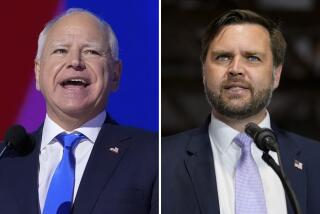Clinton and Bush Settle on Debates : Campaign: Deal calls for three 90-minute presidential sessions and one for running mates, all this month. Formats will vary, and Perot plans to participate.
- Share via
WASHINGTON — President Bush and Democratic challenger Bill Clinton agreed Friday to debate each other, and probably Ross Perot, three times over a nine-day period beginning Oct. 11. The formal announcement is expected to come today.
In addition to those three debates, the vice presidential candidates will face each other once, on Oct. 13. Each encounter will last 90 minutes, and the formats will vary--mixing reporters asking questions, a moderator simply playing referee and questions from an audience.
After weeks of squabbling and exchanges of insults, the final bargain involved compromises on both sides--but more from the Republicans, who gave in significantly over the timing. The Clinton camp compromised slightly over the format of the debates.
Certain details have still to be worked out. The first debate on Oct. 11 conflicts with a baseball playoff game. The debate scheduled for Oct. 15 would conflict with a possible seventh game of the American League playoffs. The last debate on Oct. 19 conflicts with Monday night football and could be changed to Oct. 18.
But those details were being left to less senior officials after delegations for both Clinton and Bush agreed, following three days of marathon negotiations, on the substance of the timing and the schedule.
Both the Democrats and Republicans said they would welcome Perot at the debates, and Perot plans to participate. Asked Friday by Barbara Walters during an interview on ABC’s “20/20” program if he would debate, Perot replied, “Anytime, anywhere.” He said his running mate, James B. Stockdale, would also join in the vice presidential debate.
The final schedule amounts to a retreat for Bush. He wanted the debates to continue until Nov. 1, only two days before the election, to try to keep voters, who currently seem to be leaning toward Clinton, from making up their minds for as long as possible.
“It’s an open secret that we wanted the last one on Nov. 1, because that would give them (the Democrats) only 48 hours to recover if it went badly,” said a senior White House official. “We came back 11 or 12 days. They moved one day.”
Clinton, in return, gave in on his insistence that all debates feature simply the candidates and a single moderator, a format that an independent bipartisan commission had recommended would make for the most direct confrontation between candidates.
Under the agreement, none of the presidential debates will follow that plan in full. The first debate will feature a panel of reporters, the second will have a single moderator but will also feature questions from the audience and the final debate will be split between a single moderator and a panel. The vice presidential debate Oct. 13 will have a single moderator.
Clinton negotiators touted the deal as a victory.
“We feel good about this,” said Clinton’s chief debate negotiator Mickey Kantor. “We came out with about everything we wanted.”
A senior Administration official, however, insisted that the debate agreement gave Bush some advantages. By having three debates “we keep Clinton from doing what Clinton does best--out meeting voters--and he’s not going to be able to do that,” the official said.
In addition, the official insisted, the chief goal all along for Bush strategists was to start the debates late, something they achieved.
“We’re going to delay them (the debates) as long as we possibly can,” one Administration aide said before the negotiations began.
Under the original commission proposal, the debates would have started on Sept. 22 and would have been finished on Oct. 15. Bush aides wanted to wait until later in hopes of raising doubts about Clinton in voters’ minds before the two would take the stage against each other and rejected each of the original commission-sponsored debates as they came up.
Clinton insisted to aides that they negotiate a deal that would not allow a debate in the final two weeks of the campaign.
“They could just throw a lot of dirt at you, and say anything they want and you wouldn’t have time to turn it around,” said one campaign official. Avoiding that possibility “was Clinton’s top priority,” the official said.
A source familiar with the negotiations said the talks opened Wednesday evening on a belligerent note as Kantor tried to lecture Bush aides about what he called their “cynical” approach to the debate question. Most of that first meeting was taken up with “posturing,” Kantor said.
On Thursday, however, the two sides got down to business, with the Republican side, led mostly by budget director Richard G. Darman, moving off its insistence on a final Nov. 1 debate and offering a compromise of Oct. 25. The Democrats did not budge.
The Republicans then offered Oct. 19 in return for Democratic agreement that the first debate feature a panel of reporters, a format that might allow tougher questioning of Clinton.
The Republicans then made several other concessions. They abandoned their initial insistence that at least one debate be limited to foreign policy. They agreed to allow the bipartisan commission to sponsor the sessions. They agreed on having audiences for all the debates, which the Republicans initially had resisted.
But the Republicans said they were not displeased. “The more we thought about it, the more we liked the compression (of the debates) to really generate some momentum and get some bounce out of it in the last two weeks of the campaign,” said Bush campaign aide Frederic V. Malek.
The location for the first debate seems likely to be St. Louis. The second presidential debate is set for Richmond, Va., on the 15th. The third debate will be in East Lansing, Mich., on the 18th or 19th. The vice presidential debate likely will be held in Atlanta.
Clinton, for one, began setting about Friday to try to shape the expectations in the media about the debate.
As he was leaving Dayton, Ohio, for Flint, Mich., Clinton took pains to praise Bush’s debating skills. “He’s won every debate he’s ever been in,” except one against Ronald Reagan in 1980. “He’s a good debater. I’ve seen the debates with (Michael S.) Dukakis and all the others--he’s won every one. . . . “
Clinton even praised Perot. “I think he’ll do fine. He’ll be at ease. You know, nothing to lose. I think he’ll be very relaxed.”
And Clinton? “I don’t know, but I’ll do my best. I’ll do the best I can.”
Times staff writers Doyle McManus, Cathleen Decker, Douglas Jehl and Jonathan Gaw contributed to this story.
Today on the Trail . . .
Gov. Bill Clinton campaigns in St. Louis and Washington, D.C.
President Bush campaigns in Clearwater, Fla., Homestead, Ft. Lauderdale.
Ross Perot has no public events scheduled.
Debate Schedule
Here are the plans for the presidential and vice presidential debates: PRESIDENTIAL When: October 11 Where: St. Louis (tentative)
When: October 11 Where: St. Louis (tentative)
When: October 15 Where: Richmond, Va.
When: October 18 or 19 Where: E. Lansing, Mich.
When: October 18 or 19 Where: E. Lansing, Mich. VICE PRESIDENTIAL When: October 13 Where: Atlanta (tentative)
More to Read
Get the L.A. Times Politics newsletter
Deeply reported insights into legislation, politics and policy from Sacramento, Washington and beyond. In your inbox twice per week.
You may occasionally receive promotional content from the Los Angeles Times.











